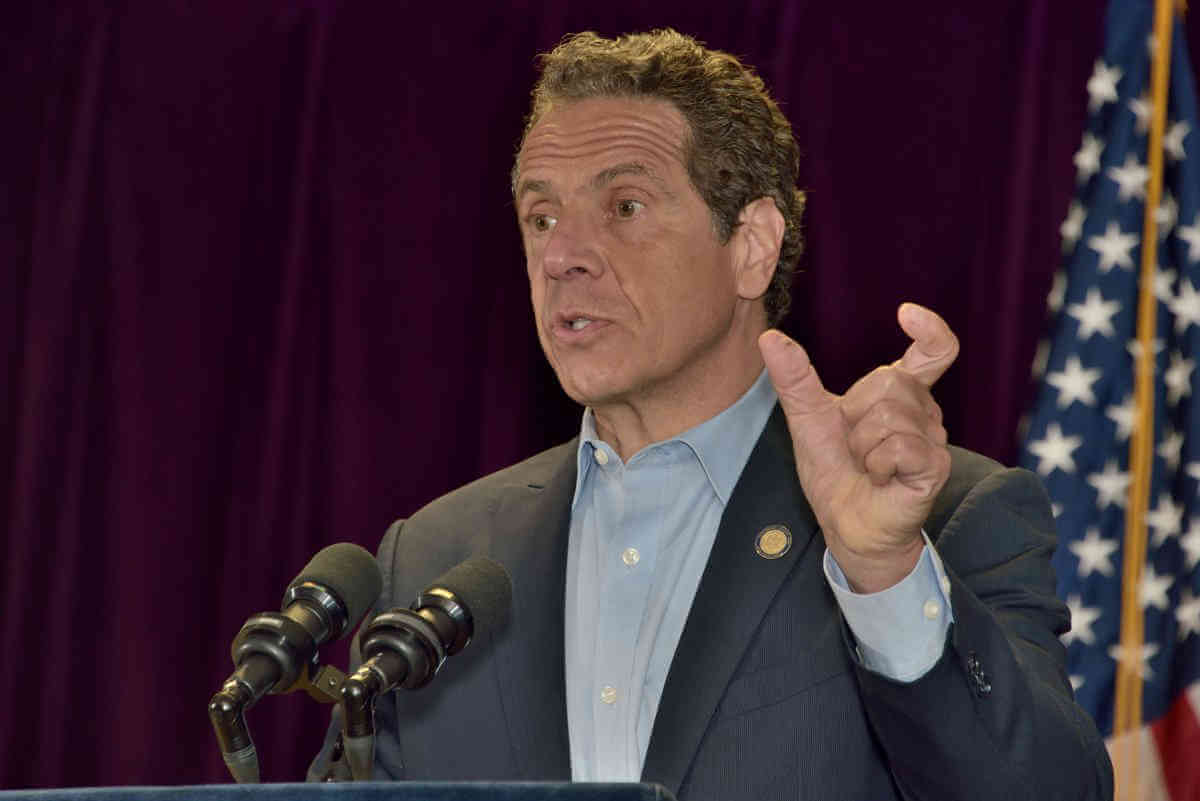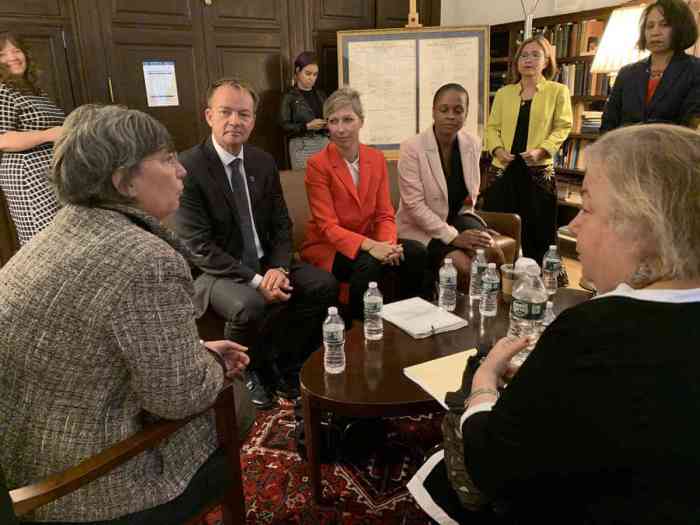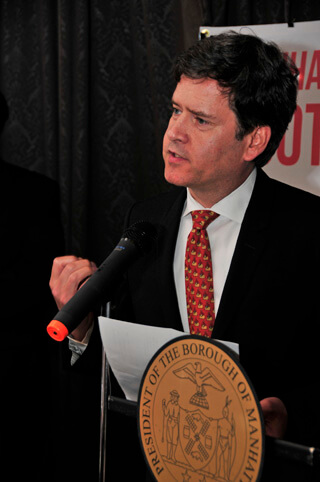Governor Andrew Cuomo, Bravo TV show host Andy Cohen, and numerous LGBTQ advocates gathered at the LGBT Community Center in Manhattan on June 10 to send a last-minute message to state lawmakers: Pass gestational surrogacy and ban the so-called gay and trans panic defense.
Cuomo used the event to reiterate many of the same messages he pushed at a press event just 10 days before: That both of those bills address lingering remnants of homophobia and action must be taken to address them before the State Senate and Assembly wrap up the legislative session on June 19.
“The extension of marriage equality is the ability to have a family. If you’re an infertile couple or an LGBTQ couple, you need assistance in having a child,” Cuomo said regarding gestational surrogacy, which allows couples to have a child carried to term by a paid surrogate who has no biological tie to the parent or the child. “It is that simple.”
Cohen, who has a child who was born through a surrogate, voiced his support for the bill, saying, “In 2019, no one should have to forfeit the joy of raising a child — not in an era when modern medicine is performing new miracles every day, and when we have reached a wide consensus that the only prerequisite to forming a family is love.”
Though the event touched on both gestational surrogacy and the gay and trans panic defense — a legal strategy by which defendants aim to mitigate their responsibility in a homicide by arguing that the victim’s sexual orientation or gender identity led them to react violently — the focus was overwhelmingly on surrogacy. The extra attention on the surrogacy effort raises questions about the confidence Cuomo and its legislative sponsors have in their ability to pass it before the end of the session.
Some feminists have raised concern that surrogates carrying the babies could fall victim to health risks and be victimized by wealthy and oftentimes foreign prospective parents who could take advantage of lower-income women by only paying them $10,000 to $30,000 — or as little as $1.54 per hour — to carry a baby. But some of the most vociferous opponents of surrogacy rights have included fringe transphobic groups associated with people who identify as trans-exclusionary radical feminists. One of those groups, ObjectUK, joined opponents of sex work decriminalization at City Hall in March and held a sign saying, “No to the sex trade, surrogacy, and transgenderism.”
Cuomo and state lawmakers — including out gay Manhattan State Senator Brad Hoylman, who was in attendance at the June 10 event and is carrying the bill in the upper chamber — have argued the bill features the best protections for surrogates in the nation. Surrogates will be provided with an attorney representing them during the pregnancy and will be further shielded by a health insurance plan that covers their medical treatments throughout the pregnancy and for weeks after the baby is born.
In fact, going on the offensive, Cuomo ripped the notion that women shouldn’t have the right to consent to becoming a surrogate, saying, “It’s a woman’s body, it’s a woman’s choice — that a woman is equal to a man in every manner, shape, or form and she can make a decision for herself.”

The bill currently appears to have a smoother path in the State Senate and a full vote on both that bill and the gay and trans panic defense ban could come as early June 11. But the surrogacy bill’s prospects in the lower chamber appear to be less certain.
“We are actively trying to persuade enough members to support the bill,” Westchester Assemblymember Amy Paulin, the lead sponsor of the surrogacy bill in her chamber, told Gay City News in a phone interview on June 10. “There are a lot of people we haven’t spoken to and that’s what we’re going to do this week.”
Paulin acknowledged the concerns surrounding the rights of surrogates and said she is currently drafting a memo to lawmakers about those issues. She stressed that the bill has recently been strengthened to include more protections and that it would be far better than sticking with the current surrogacy ban, which she says forces prospective parents to take even more risks by traveling to states where the laws and the protections they offer vary widely.
“At the end of the day, we will be able to persuade anyone who has that concern that the current law exploits women surrogates and that the new law will be the gold standard,” she said. “Our residents are going to those states [where some form of gestational surrogacy is legal] and there are no protections.”
Recent changes to the bill include the establishment of a bill of rights for surrogates that guarantees protections that must not only be included in the contracts between surrogates and parents but also embedded into the statute itself. Lawmakers also adjusted the proposed bill in such a way that prevents foreign parents from traveling to New York to contract with a surrogate.
Paulin said opponents of the bill, outside of the religious organizations that typically push against any advancement of reproductive rights, have consisted of only 100 individual people. Thus far, she has not heard of any opposition from advocacy groups.
Out lesbian Assemblymember Deborah Glick of Manhattan, who has been an advocate for women’s rights during her nearly three decades in office, is not currently listed as among the nearly three-dozen co-sponsors of the gestational surrogacy bill, and it is not clear whether she supports it. Glick did not return phone calls several hours after Gay City News sought her comment on the measure, and when reached by phone, she said she was in the middle of something and would need to call back.



































